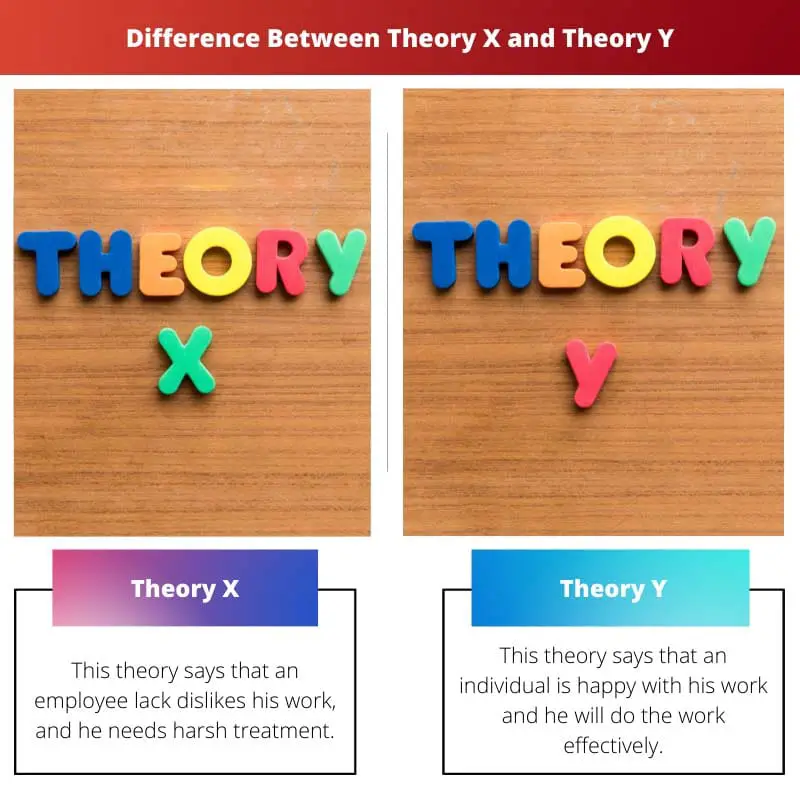The manager has to observe everything and then make a move. There are various approaches to managing people based on traits. Two theories for this are- Theory X and Theory Y.
Key Takeaways
- Theory X assumes employees are inherently lazy and need strict supervision, while Theory Y posits that workers are self-motivated and seek responsibility.
- Managers adhering to Theory X tend to employ authoritative leadership styles, while Theory Y managers favor participative and empowering approaches.
- Companies with Theory X orientations may experience lower employee satisfaction and higher turnover, while Theory Y organizations benefit from increased engagement, creativity, and productivity.
Theory X vs Theory Y
Managers need to be authoritative and directive in their approach to managing employees, with a focus on maintaining strict control over their work. Managers should be supportive and collaborative in their approach to managing employees, empowering them to take ownership of their work.

Theory X states that the manager should harshly treat the employees to achieve the goals of the organization. It says that it is the best way to persuade them so that they work effectively.
It says that both their goals should not contradict each other. It is a democratic management form that says employees have enough self-motivation.
Comparison Table
| Parameters Of Comparison | Theory X | Theory Y |
|---|---|---|
| Definition | This theory says that an employee lack dislikes his work and he needs harsh treatment. | This theory says that an individual is happy with his work and he will do the work effectively. |
| Leadership | Autocratic style. | Democratic style. |
| Motivation | Lacks self-motivation. | Has enough self-motivation. |
| Control | Centralization of authority. | Decentralization of authority. |
| Focus | It focuses on security and psychological needs. | It focuses on self-actualization and esteem needs. |
What is Theory X?
In this theory, management is extremely harsh. The authorities take a pessimistic view of their employees and consider them as people who lack self-motivation.
The style of management is authoritarian in this theory. The organizations that opt for theory x have repetitive work, and remuneration is given based on performance.
There are certain assumptions to this theory-
- The managers need to force and control the employees to get the work done.
- They lack self-motivation and will not work effectively.
- They need supervision at every step of their work.
According to these assumptions, the management is responsible for acquiring resources to gain in the economy.
What is Theory Y?
In this theory, the management is friendly and lets the employees participate in making decisions for the organization. The authorities take an optimistic view of their employees and consider them people who can motivate themselves in their way.
The goals of both the organization and the people working in it should not contradict. They focus on a collaborative environment and a relationship based on trust. Supervisors encourage the workers to build skills and develop themselves.
There are certain assumptions to this theory-
- An individual does not escape his responsibilities, but he seeks them.
- They enjoy taking authority in their position and ownership of their work.
- They need less direction and can work on their own.
According to these assumptions, the management alone is not responsible for acquiring resources to grow the economy. The employees are equally liable.
Main Differences Between Theory X and Theory Y
- Self-motivation is not present in theory x, but in theory y.
- There is centralization of authority in the company in theory x. On the other hand, there is a decentralization of command in the company in theory y.

- https://journals.aps.org/pr/abstract/10.1103/PhysRev.139.A357
- https://redined.educacion.gob.es/xmlui/handle/11162/64896

The comparison table offers a clear, concise overview of the differences between Theory X and Theory Y in terms of leadership style, employee motivation, and focus. It’s an excellent resource for understanding the two theories.
The article provides valuable insight into the Theory X and Theory Y management approaches, highlighting the differing attitudes towards employee motivation and control.
The theories present distinct perspectives on employee management. While Theory X emphasizes control and self-motivation, Theory Y focuses on collaboration and autonomy. The impact of these approaches on organizational outcomes is crucial to consider.